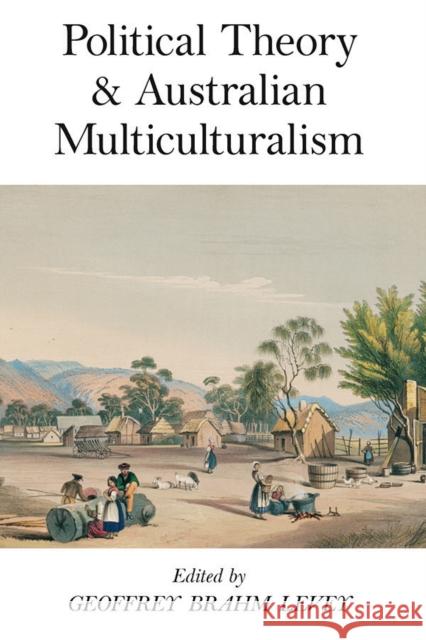Political Theory and Australian Multiculturalism » książka
Political Theory and Australian Multiculturalism
ISBN-13: 9780857456298 / Angielski / Miękka / 2012 / 328 str.
Political Theory and Australian Multiculturalism
ISBN-13: 9780857456298 / Angielski / Miękka / 2012 / 328 str.
(netto: 137,81 VAT: 5%)
Najniższa cena z 30 dni: 140,79 zł
ok. 22 dni roboczych.
Darmowa dostawa!
The book deserves the attention of all those who wish to see the standard questions in the Anglo-American theory of multiculturalism debated from an Australian perspective, against the background of its distinctive history, demography, and party politics. Nationalities Papers It is certainly the best and most serious book on Australian multiculturalism ever published. James Jupp, Director of the Centre for Immigration & Multicultural Studies, Australian National University What strikes the reader straight away is the quality of the contributors coming from a range of disciplines both within and beyond political theory and the organisation of the text itself. Overall, Political Theory and Australian Multiculturalism is a valuable contribution to understanding Australia's unique experience of multiculturalism in international context and goes a long way to awakening debates about multiculturalism in political theory and other disciplines. Australian Journal of Political Science All of the essays are thoughtful and well written. Taken together, they provide a helpful overview of the intellectual milieu within which Australian multiculturalism has arisen and evolved. International Migration & Integration Multiculturalism has been one of the dominant concerns in political theory over the last decade. To date, this inquiry has been mostly informed by, or applied to, the Canadian, American, and increasingly, the European contexts. This volume explores for the first time how the Australian experience both relates and contributes to political thought on multiculturalism. Focusing on whether a multicultural regime undermines political integration, social solidarity, and national identity, the authors draw on the Australian case to critically examine the challenges, possibilities, and limits of multiculturalism as a governing idea in liberal democracies. These essays by distinguished Australian scholars variously treat the relation between liberalism and diversity, democracy and diversity, culture and rights, and evaluate whether Australia's thirty-year experiment in liberal multiculturalism should be viewed as a successful model. Geoffrey Brahm Levey is an Australian Research Council Future Fellow in political science at the University of New South Wales, where he was founding director of the Program in Jewish Studies. He is co-editor of Secularism, Religion and Multicultural Citizenship (with Tariq Modood, 2008) and Jews and Australian Politics (with Philip Mendes, 2004)
The book deserves the attention of all those who wish to see the standard questions in the Anglo-American theory of multiculturalism debated from an Australian perspective, against the background of its distinctive history, demography, and party politics. Nationalities PapersIt is certainly the best and most serious book on Australian multiculturalism ever published. James Jupp, Director of the Centre for Immigration & Multicultural Studies, Australian National UniversityWhat strikes the reader straight away is the quality of the contributors coming from a range of disciplines both within and beyond political theory and the organisation of the text itself. Overall, Political Theory and Australian Multiculturalism is a valuable contribution to understanding Australias unique experience of multiculturalism in international context and goes a long way to awakening debates about multiculturalism in political theory and other disciplines. Australian Journal of Political ScienceAll of the essays are thoughtful and well written. Taken together, they provide a helpful overview of the intellectual milieu within which Australian multiculturalism has arisen and evolved. International Migration & IntegrationMulticulturalism has been one of the dominant concerns in political theory over the last decade. To date, this inquiry has been mostly informed by, or applied to, the Canadian, American, and increasingly, the European contexts. This volume explores for the first time how the Australian experience both relates and contributes to political thought on multiculturalism. Focusing on whether a multicultural regime undermines political integration, social solidarity, and national identity, the authors draw on the Australian case to critically examine the challenges, possibilities, and limits of multiculturalism as a governing idea in liberal democracies. These essays by distinguished Australian scholars variously treat the relation between liberalism and diversity, democracy and diversity, culture and rights, and evaluate whether Australias thirty-year experiment in liberal multiculturalism should be viewed as a successful model.Geoffrey Brahm Levey is an Australian Research Council Future Fellow in political science at the University of New South Wales, where he was founding director of the Program in Jewish Studies. He is co-editor of Secularism, Religion and Multicultural Citizenship (with Tariq Modood, 2008) and Jews and Australian Politics (with Philip Mendes, 2004).











